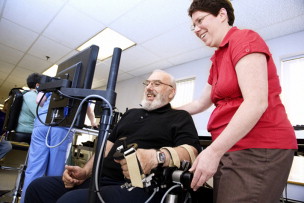Robot-assisted therapy improves arm function in stroke patients
 Washington, Aug 11 : Robot-assisted therapy has measurable benefits for patients with a weaker arm following a stroke, according to a new research.
Washington, Aug 11 : Robot-assisted therapy has measurable benefits for patients with a weaker arm following a stroke, according to a new research.
Researchers from the National Taiwan University, Chang Gung University and Taipei Hospital, enrolled 20 patients in the study comparing robot-assisted therapy combined with functional training against an active control treatment group.
Stroke patients usually have difficulties transferring motor skills learned in therapy to their daily living environment because of cognitive deficits.
The researchers included real-world arm activity in the study by having patients wear accelerometers on both arms daily as they went about their normal tasks.
One of the key findings of the study was that robot-assisted therapy, when combined with functional task training, helps functional arm use and improves bimanual arm activity in daily life.
"In this study of rehabilitation approaches for patients with mild-to-moderate upper limb impairment six months after a stroke, we found significantly greater benefits of robot-assisted therapy compared with the active control group on the amount and quality of functional arm activity for the hemiplegic hand in the living environment," said researcher Keh-chung Lin of the National Taiwan University.
"Moreover, robot-assisted therapy had superior benefits on improving bimanual arm activity," he added.
The research featured in the journal Clinical Rehabilitation, published by SAGE. (ANI)